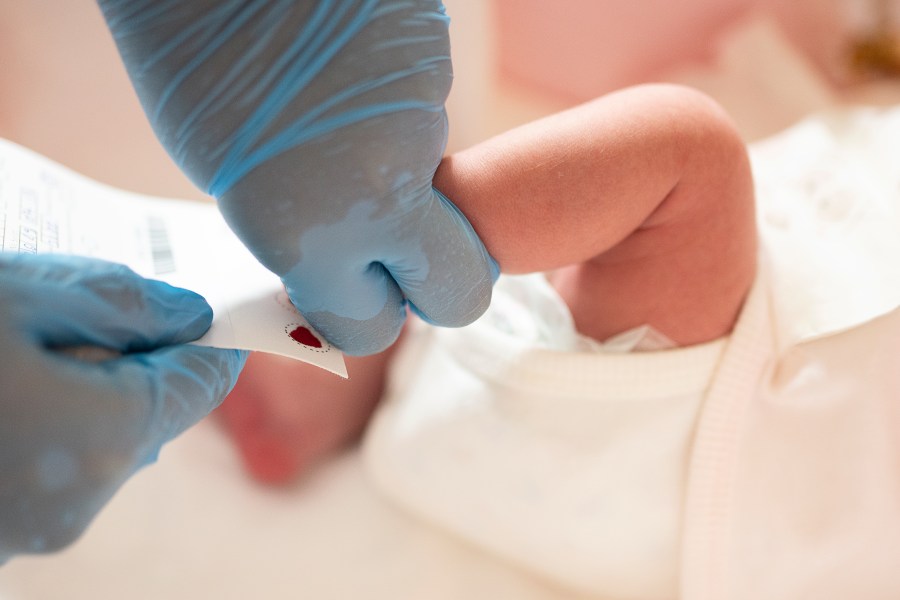Why a blood screening program for newborns is at the center of a genetic data controversy

Throughout the U.S., usually right after a baby is born, a doctor or nurse takes a pinprick of blood from the newborn — often from its cute, little feet — to screen for diseases or genetic defects.
These blood tests are mandatory and create a health and genetic database. But who gets access to that genetic information, and for what purpose, is at the center of several legal fights.
In New Jersey, the Office of the Public Defender recently sued the state testing program after police allegedly used a newborn’s blood sample to help them obtain a warrant to get DNA from the father.
“Marketplace Tech’s” Kimberly Adams recently spoke with reporter Nikita Biryukov at the New Jersey Monitor, who broke the story. The following is an edited transcript of their conversation.
Nikita Biryukov: So what happened in this case, which involved a sexual assault dating back from 1996, the New Jersey State Police had narrowed down their list of suspects to a man and his brothers. They didn’t have probable cause for a warrant. But they did, we think, obtain through a subpoena to the state-run lab that tests this newborn blood for various disorders. The test results in the materials are stored for years and specifically, we believe, up to 23 years. They filed the subpoena for the man’s child and obtained that child’s blood samples. And they used that blood and the DNA testing that they conducted on it to obtain a warrant against the man.
Kimberly Adams: These are the allegations. What did the New Jersey State Police say about what they’ve done?

Biryukov: Oh, well, they’ve been very tight-lipped. We haven’t gotten so much as a statement out of them. And our records request, which went to the blood screening laboratory, not the state police, because we were seeking a list of subpoenas just to tell how often and how widespread this practice is, those were denied. So there’s really been not any response from the state police.
Adams: These newborn testing programs are often mandatory all over the country. But do parents have an option to control how their child’s genetic data is used or even opt out?
Biryukov: So in New Jersey, the program is mandatory, and there is no option to opt out. Additionally, there’s some questions about how informed parents are about this program. There’s no real requirement on our books that they be told that their child’s blood is being taken to be tested, though sometimes parents will receive a brochure on the same. However, I don’t think any of them are aware that these records and the blood specifically are being held for more than two decades. Nor do I think that they’re aware or would be OK with that blood being used for purposes other than testing their children for diseases.
Adams: Yeah, I’m just trying to imagine, you know, you’ve got your newborn, you’re all excited. And, you know, the doctors and nurses say, “Hey, we’re just going to do a blood test just to make sure there are no problems.” I can’t imagine any parent even having pause for something like that.
Biryukov: Yeah, and what we’ve heard a lot about from parents and people who are active in this space is that there’s an additional sort of layer on it because you have these people either coming out of childbirth or witnessing the birth of their child, so they’re kind of stuck in that haze. So even if, you know, they’re given a rather brief description of the program, there’s no guarantee that they’re going to remember all of it or even fully grasp what is happening here.
Adams: What are some of the concerns that New Jersey’s Office of the Public Defender have raised with these allegations against the state police specifically?
Biryukov: So the biggest one among those, I think, is really a due process concern. The state police allegedly subpoenaed the testing laboratory for records of a child who was not even born at the time of the alleged crime. They use that as probable cause to obtain a warrant, the probable cause limit and the strict warrant rules have almost been waived by virtue of the state running this mandatory testing program.
Adams: How widespread is this kind of practice throughout the country?
Biryukov: So it is a little bit hard to say, but we definitely have seen some stuff like this in other places. There is a lawyer in Michigan who has alleged that Michigan has also used their newborn testing database to aid criminal investigations. Texas has shared blood spots taken from newborns with the federal government. That information was used to build a DNA database to track cold cases.
Adams: What sort of privacy implications does it have for the state and how they maintain or keep track of this genetic data? It feels like the state has a pretty high burden when it comes to making decisions about the privacy of this database.
Biryukov: This question is actually a bit more complicated than it might appear on its face because there are legitimate public health reasons for this testing program, and even to some degree the retention of blood spots. But the more people that realize how these test results and the test materials gathered from newborns can be used, the less people are going to trust the system. It’s not super well-known even among parents now, but this is the sort of thing that draws attention, and it really can create rippling effects in public health if parents start to try to opt out of this.
Related links: More insight from Kimberly Adams
You can read Biryukov’s article here as well as followup coverage from Law360 and Wired.
And like Biryukov mentioned, Michigan has a similar case in which an attorney is suing the state over its mandatory screening program, demanding more transparency about how the blood can be used and how long samples should be kept on record.
But remember, the point of these blood tests is to diagnose diseases. If you’re interested in seeing what your state is looking for in these newborn blood tests, the education resource center Baby’s First Test breaks that down here.
The site also has an FAQ page about what happens to the blood sample after the tests are done, which also varies by state.
.
The future of this podcast starts with you.
Every day, the “Marketplace Tech” team demystifies the digital economy with stories that explore more than just Big Tech. We’re committed to covering topics that matter to you and the world around us, diving deep into how technology intersects with climate change, inequity, and disinformation.
As part of a nonprofit newsroom, we’re counting on listeners like you to keep this public service paywall-free and available to all.
Support “Marketplace Tech” in any amount today and become a partner in our mission.
















